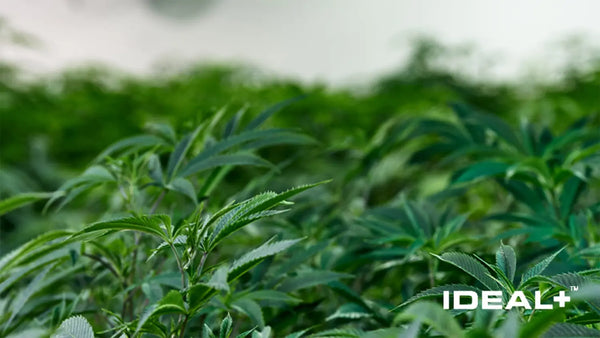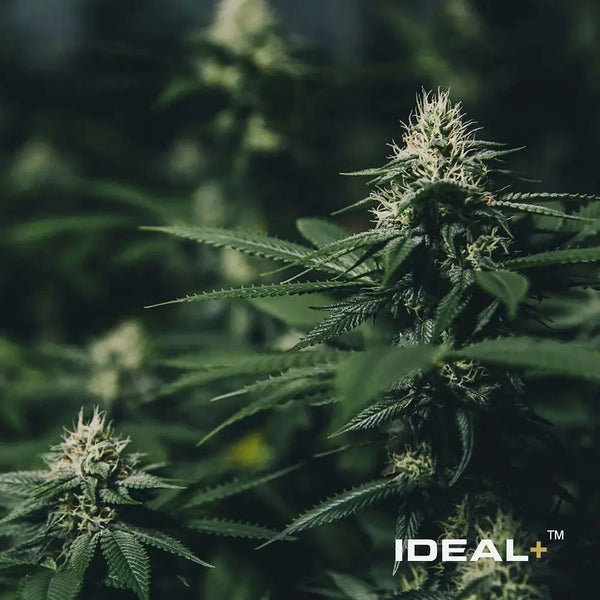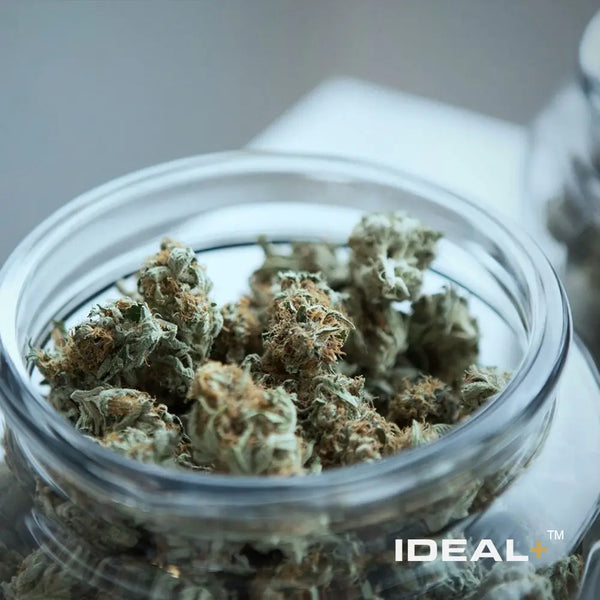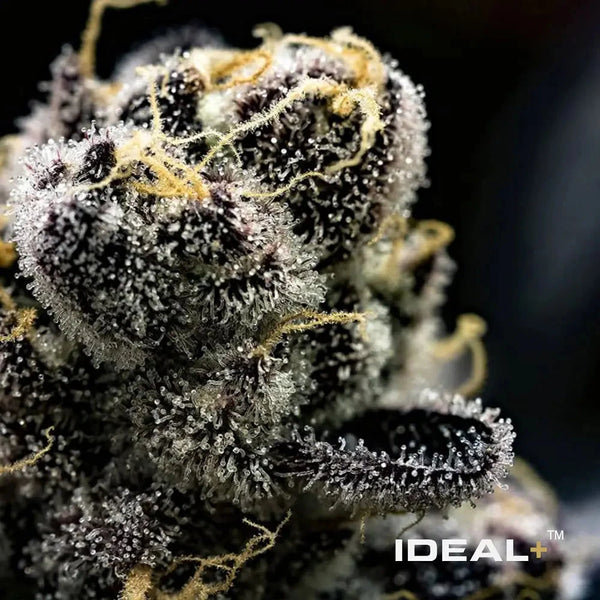No Products in the Cart
GET 25% OFF YOUR FIRST ORDER | GREENHOUSE THCA FLOWER 7g - $26.24 $34.99

The sleep aid industry has exploded into a $15 billion market, with millions of Americans searching for that elusive perfect night's rest. While pharmaceutical sleep medications dominate pharmacy shelves, a growing number of people are turning to natural alternatives, seeking effective solutions without the dependency risks and morning grogginess associated with prescription drugs.
Among the most popular natural options, the debate often comes down to CBD vs melatonin – two fundamentally different compounds that approach sleep through distinct biological pathways. But how do these compare to other natural sleep aids, and which combination might work best for your specific sleep challenges?
This comprehensive guide examines the science behind natural sleep aids, comparing effectiveness, safety profiles, and cost-effectiveness to help you make an informed decision about your sleep health journey.
The shift toward natural sleep remedies reflects a broader wellness trend, with consumers increasingly skeptical of synthetic pharmaceuticals and their potential side effects. The natural sleep aids comparison reveals a diverse ecosystem of options, each targeting different aspects of sleep dysfunction.
Unlike prescription sleep medications that often work by depressing the central nervous system, natural sleep aids typically work through gentler mechanisms – supporting the body's existing sleep processes rather than overriding them. This fundamental difference explains why natural options often have fewer side effects but may require more time to show optimal results.
The most researched natural insomnia remedies fall into several categories: hormone regulators (like melatonin), anxiety reducers (including CBD and L-theanine), muscle relaxants (such as magnesium), and traditional herbs (like valerian root and chamomile). Understanding how these different mechanisms work helps explain why combination approaches often prove more effective than single-ingredient solutions.

Melatonin stands as perhaps the most well-known natural sleep aid, functioning as a hormone naturally produced by the pineal gland in response to darkness. This "sleep hormone" plays a crucial role in regulating circadian rhythms – the internal biological clock that governs our sleep-wake cycles.
The melatonin mechanism is elegantly simple: as darkness falls, melatonin production increases, signaling to the body that it's time to prepare for sleep. Supplemental melatonin essentially amplifies this natural signal, particularly helpful for people whose natural melatonin production has been disrupted by factors like blue light exposure, shift work, or age-related decline.
Research shows melatonin is most effective for specific types of sleep issues. A 2013 meta-analysis of 19 studies found melatonin reduced sleep onset time by an average of 7 minutes and increased total sleep time by 8 minutes. While these numbers might seem modest, they represent significant improvements for people struggling with sleep initiation.
Melatonin's effectiveness varies considerably based on the type of sleep problem. It works best for:
However, melatonin shows limited effectiveness for sleep maintenance issues – the ability to stay asleep throughout the night. This limitation becomes important when comparing it to other natural alternatives that may address different aspects of sleep quality.
While generally well-tolerated, melatonin isn't without potential drawbacks. Common side effects include next-day drowsiness, headaches, and dizziness. More concerning for long-term users is the potential for tolerance development and the disruption of natural melatonin production.
Some studies suggest that regular melatonin supplementation might suppress the body's own melatonin production, creating a dependency cycle. Additionally, melatonin can interact with various medications, including blood thinners and diabetes medications, making medical consultation essential for many users.

Cannabidiol (CBD) approaches sleep through an entirely different biological pathway than melatonin, primarily targeting the endocannabinoid system – a complex network of receptors involved in regulating mood, pain, and sleep. This fundamental difference in mechanism makes CBD a compelling alternative for people who don't respond well to melatonin or who have sleep issues rooted in anxiety or chronic pain.
Unlike melatonin's direct effect on circadian rhythms, CBD influences sleep indirectly by addressing underlying factors that prevent restful sleep. Research suggests CBD interacts with several receptor systems, including serotonin receptors involved in anxiety regulation and vanilloid receptors associated with pain perception.
A 2019 study published in The Permanente Journal found that 66.7% of patients experienced improved sleep scores within the first month of CBD use, with anxiety scores improving even more dramatically. This suggests CBD's sleep benefits may stem largely from its anxiolytic (anxiety-reducing) properties.
What makes CBD unique among herbal sleep aids vs CBD comparisons is its multi-target approach. Rather than simply promoting drowsiness, CBD appears to address several common sleep disruptors:
The versatility of CBD makes it particularly appealing for people whose sleep issues stem from multiple factors, offering a more comprehensive approach than single-mechanism solutions.
When directly comparing CBD vs melatonin, several key factors emerge that can help guide individual choice:
Melatonin typically works relatively quickly, with effects noticeable within 30-60 minutes of ingestion. However, standard melatonin has a relatively short half-life, meaning its effects may not last throughout the entire sleep period.
CBD generally has a slower onset, taking 1-2 hours to reach peak effectiveness, but maintains more consistent levels throughout the night. This difference makes melatonin better for sleep initiation, while CBD may be superior for sleep maintenance.
The dependency profiles differ significantly between these compounds. Melatonin carries a moderate risk of physiological dependency, as regular supplementation may suppress natural production. CBD shows minimal dependency potential, with most research suggesting it's well-tolerated even with long-term use.
Melatonin side effects tend to be related to timing and dosage:
CBD side effects are generally milder and less frequent:
The cost comparison reveals interesting trade-offs. Melatonin is generally less expensive per dose, with monthly costs ranging from $5-20 for quality supplements. CBD products typically cost $30-100 monthly, depending on potency and product type.
However, when evaluating cost-effectiveness, CBD's multi-target approach may provide better value for people dealing with anxiety, pain, and sleep issues simultaneously, potentially replacing multiple separate supplements.

Beyond the CBD vs melatonin debate, several other natural sleep aids that actually work deserve consideration in any comprehensive sleep strategy.
Valerian root has been used for sleep support for over 2,000 years, with modern research providing mixed but generally supportive evidence. A 2020 systematic review found valerian root improved sleep quality in several studies, though effects were generally modest.
Effectiveness: Moderate evidence for improved sleep quality Onset: 2-4 weeks for optimal effects Cost: $10-25 monthly Best for: People seeking traditional herbal remedies with some scientific backing
Magnesium deficiency affects up to 50% of adults and directly impacts sleep quality through its role in muscle relaxation and nervous system regulation. Magnesium supplementation shows consistent benefits for sleep quality, particularly in deficient individuals.
Effectiveness: Strong evidence for sleep quality improvement in deficient individuals Onset: 1-4 weeks Cost: $8-20 monthly Best for: People with muscle tension, restless legs, or confirmed magnesium deficiency
Found naturally in tea leaves, L-theanine promotes relaxation without sedation by increasing alpha brain waves associated with calm alertness. Research shows L-theanine can improve sleep quality while maintaining next-day cognitive function.
Effectiveness: Good evidence for anxiety reduction and sleep quality Onset: 30-60 minutes Cost: $15-30 monthly Best for: People who need to relax but maintain mental clarity
Chamomile contains apigenin, a compound that binds to benzodiazepine receptors in the brain, producing mild sedative effects. While research is limited, chamomile shows promise for mild sleep issues and anxiety.
Effectiveness: Limited but positive evidence Onset: 30-60 minutes Cost: $5-15 monthly Best for: People seeking very gentle, traditional remedies
The CBD melatonin combination represents one of the most promising approaches to natural sleep support, combining melatonin's circadian rhythm regulation with CBD's anxiety and pain-relieving properties. This synergistic approach addresses multiple aspects of sleep dysfunction simultaneously.
Research suggests that combining different natural sleep aids can produce effects greater than the sum of their parts. The CBD melatonin combination works particularly well because:
Commercial products increasingly feature carefully balanced combinations of natural sleep aids. Effective formulations typically include:
Base Layer: Melatonin (0.5-3mg) for circadian support Anxiety Support: CBD (10-25mg) or L-theanine (100-200mg) Physical Relaxation: Magnesium (200-400mg) Traditional Support: Chamomile or valerian root extracts
The most effective approach often involves creating a personalized "stack" based on individual sleep challenges:
For Anxiety-Based Insomnia:
For Circadian Rhythm Disruption:
For Pain-Related Sleep Issues:
Determining is CBD or melatonin better for sleep depends entirely on individual circumstances, sleep patterns, and underlying health factors. A systematic approach to selection improves the likelihood of success.
Primary Sleep Challenge Identification:
Anxiety-Dominant Sleep Issues: CBD emerges as the clear winner, with L-theanine as a close second. The anti-anxiety properties address the root cause rather than masking symptoms.
Circadian Rhythm Disorders: Melatonin remains the gold standard, particularly for jet lag, shift work, and delayed sleep phase syndrome.
Pain-Related Sleep Disruption: CBD's anti-inflammatory properties make it the most logical choice, potentially combined with magnesium for muscle-related discomfort.
Age-Related Sleep Decline: Combination approaches work best, as aging affects multiple sleep systems simultaneously.
Week 1-2: Single ingredient trial
Week 3-4: Optimization phase
Week 5-6: Combination exploration (if single ingredient shows partial benefit)
Based on current research quality and quantity, natural sleep aids that actually work can be ranked in evidence-based tiers:
This ranking helps prioritize options when building an evidence-based natural sleep protocol, though individual responses can vary significantly regardless of research quality.
When evaluating natural sleep aids comparison from a financial perspective, several factors beyond simple per-dose costs merit consideration:
Budget-Friendly Options ($0.15-0.50 per night):
Mid-Range Options ($0.50-2.00 per night):
Premium Options ($1.00-4.00 per night):
Multi-Benefit Analysis: CBD's ability to address anxiety, pain, and sleep simultaneously may provide better value than multiple single-purpose supplements.
Long-Term Sustainability: Products with lower dependency potential may prove more cost-effective over time, even with higher upfront costs.
Quality of Life Factors: The most expensive option that consistently provides restorative sleep may be more cost-effective than cheaper alternatives that provide inconsistent results.
Don't Compromise On:
Smart Savings Strategies:
While natural sleep aids are generally safer than pharmaceutical alternatives, natural insomnia remedies still require careful consideration of potential interactions and contraindications.
Melatonin Interactions:
CBD Interactions:
Magnesium Interactions:
Pregnancy and Breastfeeding: Most natural sleep aids lack sufficient safety data for pregnant or breastfeeding women. Consultation with healthcare providers is essential.
Children and Adolescents: Melatonin shows the best safety profile for younger populations, while CBD research in pediatric populations remains limited.
Elderly Adults: Increased sensitivity to all sleep aids requires lower starting doses and careful monitoring for cognitive effects.
Chronic Medical Conditions: People with autoimmune disorders, liver disease, or psychiatric conditions should exercise particular caution and seek medical guidance.
A: Yes, the CBD melatonin combination is generally considered safe for most people. These compounds work through different mechanisms and don't appear to have negative interactions. However, start with lower doses of each when combining, and consult a healthcare provider if you're taking other medications.
A: Timing varies significantly by compound:
A: CBD and L-theanine show the strongest evidence for anxiety-related sleep issues. CBD offers more comprehensive benefits but costs more, while L-theanine provides targeted anxiety relief at a lower price point.
A: Avoid products with insufficient research, excessive doses, or poor quality control. Be particularly cautious with kava (liver toxicity concerns) and products containing multiple unlisted ingredients.
A: Track multiple metrics:
Give each approach 2-4 weeks for full evaluation, as natural compounds often require time to show optimal benefits.
A: Cycling approaches depend on the specific compounds:
The journey to better sleep through natural sleep aids that actually work is deeply personal, requiring patience, experimentation, and often a willingness to combine multiple approaches. While the CBD vs melatonin debate captures much attention, the reality is that the most effective sleep solution often involves understanding your specific sleep challenges and matching them with the appropriate natural compounds.
Key Takeaways for Success:
The future of natural sleep support lies not in finding a single "best" option, but in developing personalized protocols that address individual sleep patterns, health status, and lifestyle factors. Whether that involves the circadian support of melatonin, the comprehensive benefits of CBD, or a carefully crafted combination of multiple natural compounds, the goal remains the same: consistent, restorative sleep that enhances overall quality of life.
For those ready to explore high-quality natural sleep solutions, Ideal Plus offers a comprehensive range of CBD products designed to support your journey toward better sleep. Remember, the best sleep aid is the one that works consistently for your unique needs while supporting your long-term health and well-being.